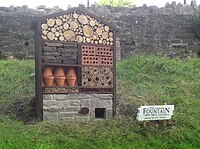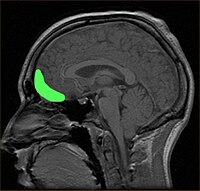
Soft haptic sensation increases the expectation in the social context but not in the non-social context.
Sign Up to like & getrecommendations! Published in 2021 at "Experimental brain research"
DOI: 10.1007/s00221-021-06198-2
Abstract: Previous studies have proposed that holding soft objects can increase expectations to be included in a Cyberball task. The present study investigated whether effects of holding soft objects on expectations are restricted to social contexts… read more here.
Keywords: ball task; task; non social; social ball ... See more keywords

Adaptive learning in non-social insects: from theory to field work, and back.
Sign Up to like & getrecommendations! Published in 2018 at "Current opinion in insect science"
DOI: 10.1016/j.cois.2018.03.008
Abstract: We review the evidence that learning affects fitness in non-social insects. Early accounts date back from the 1970s and were based on field-based observational and experimental work, yet exploration of the ways in which various… read more here.
Keywords: insects; work; social insects; field ... See more keywords

The Human Basolateral Amygdala Is Indispensable for Social Experiential Learning
Sign Up to like & getrecommendations! Published in 2019 at "Current Biology"
DOI: 10.1016/j.cub.2019.08.078
Abstract: Trust and betrayal are central to our social world, and adaptive responses to generous and selfish behavior are crucial to our economic and social well-being [1]. We learn about others' trustworthiness through trial and error… read more here.
Keywords: experiential learning; non social; basolateral amygdala; social experiential ... See more keywords

Negative affect is related to reduced differential neural responses to social and non-social stimuli in 5-to-8-month-old infants: A functional near-infrared spectroscopy-study
Sign Up to like & getrecommendations! Published in 2018 at "Developmental Cognitive Neuroscience"
DOI: 10.1016/j.dcn.2017.12.003
Abstract: Highlights • Blood oxygenation changes in infants’ right posterior temporal cortex reflect processing of social dynamic compared to non-social dynamic stimuli.• Higher levels of Negative Affect are related to a weaker hemodynamic response to social… read more here.
Keywords: non social; social stimuli; affect related; spectroscopy ... See more keywords

Connectivity between the cerebrum and cerebellum during social and non-social sequencing using dynamic causal modelling
Sign Up to like & getrecommendations! Published in 2019 at "NeuroImage"
DOI: 10.1016/j.neuroimage.2019.116326
Abstract: This analysis explores the effective connectivity of the cerebellum with the cerebral cortex during the generation of correct sequences of social and non-social events, using dynamic causal modelling (DCM). Our hypothesis is that during human… read more here.
Keywords: social non; cerebral cortex; connectivity; non social ... See more keywords

Modality-specific dysfunctional neural processing of social-abstract and non-social-concrete information in schizophrenia
Sign Up to like & getrecommendations! Published in 2021 at "NeuroImage: Clinical"
DOI: 10.1016/j.nicl.2021.102568
Abstract: Schizophrenia is characterized by marked communication dysfunctions encompassing potential impairments in the processing of social-abstract and non-social-concrete information, especially in everyday situations where multiple modalities are present in the form of speech and gesture. To… read more here.
Keywords: information; processing social; social concrete; schizophrenia ... See more keywords

Social and non-social reward learning reduced and related to a familial vulnerability in schizophrenia spectrum disorders
Sign Up to like & getrecommendations! Published in 2020 at "Schizophrenia Research"
DOI: 10.1016/j.schres.2019.10.019
Abstract: Patients with a disorder in the schizophrenia spectrum (SZ) demonstrate impairments in reward learning. A reduced sensitivity to social reward may impede social beyond non-social reward learning mechanisms. The aim of the current study was… read more here.
Keywords: game; social non; non social; social reward ... See more keywords

Mind your step: social cerebellum in interactive navigation
Sign Up to like & getrecommendations! Published in 2022 at "Social Cognitive and Affective Neuroscience"
DOI: 10.1093/scan/nsac047
Abstract: Abstract The posterior cerebellum contributes to dynamic social cognition by building representations and predictions about sequences in which social interactions typically take place. However, the extent to which violations of prior social expectations during human… read more here.
Keywords: mind step; non social; cerebellum; step social ... See more keywords

Stress axis programming generates long-term effects on cognitive abilities in a cooperative breeder
Sign Up to like & getrecommendations! Published in 2022 at "Proceedings of the Royal Society B: Biological Sciences"
DOI: 10.1098/rspb.2022.0117
Abstract: The ability to flexibly adjust behaviour to social and non-social challenges is important for successfully navigating variable environments. Social competence, i.e. adaptive behavioural flexibility in the social domain, allows individuals to optimize their expression of… read more here.
Keywords: behavioural flexibility; early life; flexibility; stress axis ... See more keywords

The computational relationship between reinforcement learning, social inference, and paranoia
Sign Up to like & getrecommendations! Published in 2022 at "PLoS Computational Biology"
DOI: 10.1371/journal.pcbi.1010326
Abstract: Theoretical accounts suggest heightened uncertainty about the state of the world underpin aberrant belief updates, which in turn increase the risk of developing a persecutory delusion. However, this raises the question as to how an… read more here.
Keywords: uncertainty; social task; paranoia associated; non social ... See more keywords

Chimpanzees’ understanding of social leverage
Sign Up to like & getrecommendations! Published in 2018 at "PLoS ONE"
DOI: 10.1371/journal.pone.0207868
Abstract: Social primates can influence others through the control of resources. For instance, dominant male chimpanzees might allow subordinates access to mate with females in exchange for social support. However, little is known about how chimpanzees… read more here.
Keywords: understanding social; non social; leverage; reward ... See more keywords